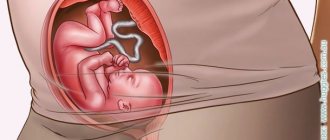The second week of pregnancy is not much different from the first. The release of the egg may be accompanied by a sensation of nagging pain on one side of the abdomen, and pinkish discharge is possible. Conception has not yet occurred, so the fetus has not yet formed. The ultrasound photo does not show anything yet; the woman’s weight does not change.
Conception has not yet occurred, so the fetus has not yet formed. The ultrasound photo does not show anything yet; the woman’s weight does not change.
In order for fertilization to be successful and pregnancy to occur, it is better to abstain from sexual relations a few days before ovulation - there will be more active sperm. Before sexual intercourse, a woman should not be overzealous with the intimate toilet - a change in the vaginal environment (due to the influence of soap or gel) can reduce the activity of fertilizing cells.
What happens at 2 weeks with the baby and mother?
In the second week, it is also too early to talk about pregnancy, but during this period important changes occur in a woman’s body, preparing it for conception. In the second week, changes continue in the ovaries and uterus, which are necessary for pregnancy to occur. The process of ovulation occurs in the ovaries. During the ovulation cycle, about 20 follicles mature in a woman’s ovary, but only one of them will become a mature egg. One of the follicles approaches the already thinned wall of the ovary, bursts and exits into the fallopian tube as a mature egg. The moment of release is called ovulation.
Ovulation is a phenomenon that is the release of an egg from the ovary into the fallopian tube as a result of the rupture of a mature follicle. During ovulation, the egg is in the second-order oocyte maturation stage.
Ovulation usually occurs on the 14th day of the menstrual cycle, but depending on the length of the cycle it can shift. A mature egg remains in the fallopian tube for no more than a day, slowly moving towards the uterine cavity. Fertilization occurs here, in the fallopian tube, where sperm penetrate through the vagina and uterine cavity.
Sperm, unlike eggs, remain viable for 72 hours. Thus, conception of a child can occur a few days after sexual intercourse. However, ovulation still remains the most favorable moment for conception. Well, it’s worth adding that depending on which sperm makes its way to the egg, the gender of the child is formed and its external characteristics are determined. Simultaneously with the changes in the ovary, the uterus begins to prepare for the implantation of a fertilized egg. The mucous layer of the uterus loosens and thickens. All this happens under the strict control of hormones produced by the ovaries.
At the moment of conception, there is a danger of disruption of fetal formation. At this time, both parents need to stop drinking alcohol and taking medications (except vitamins), smoking, and contact with household chemicals. Everyone knows about the harm from smoking.
Fetus at 2 weeks of pregnancy
What happens in the body during the 2nd week of pregnancy from conception? Let's look at everything in order. Embryo development is a long and interesting process that consists of several stages.
At the moment of fertilization, the sperm merges with a mature egg. All actions take place in the ampullary section of the fallopian tube. Next, the process of dividing the egg takes place, which descends into the uterine cavity.
During the first 4 days, a multicellular organism is formed through the process of cell division. Outwardly, it looks like a raspberry.
After the first week, implantation takes place, penetration into the layers of the uterus. The outer cells connect to blood vessels, which will later become the placenta. Others are responsible for the formation of the umbilical cord and membranes.
Internal cells are necessary for the formation of organs and systems of the fetus.
In the second week, the embryo strengthens on the wall of the uterus.
If the outcome is favorable, the embryo is fixed and takes its place. Starting from the ninth day, the umbilical cord, placenta and neural tube begin to form, which will later pass into the baby’s nervous system.
Feel
The sensations in the second week of pregnancy are practically no different from those in the first. Very often, a woman is not even aware of a very interesting situation, therefore, when a spontaneous miscarriage occurs at this time, accompanied by atypical brownish bleeding, abundant and prolonged, the woman mistakes these signs for normal menstruation and does not even realize that she was pregnant.
Signs of pregnancy at this stage are weakly expressed, but if a woman planned this pregnancy, most often she already guesses. Signs of pregnancy are caused by fairly high levels of hormones that are necessary to preserve the unborn fetus. In the second week, a woman may complain of discomfort in the lower abdomen, slight malaise, drowsiness, she becomes nervous, her mood often changes, her appetite may increase somewhat, and sometimes unexpectedly change to the point of wanting to eat something inedible, and an aversion to food may appear. some odors (smells of perfume, tobacco smoke). There is also a feeling of engorgement of the mammary glands. Most often, the pregnancy test is positive.
In addition, during this period, a woman’s libido increases and mucous discharge appears, which indicates the process of ovulation.
Embryonic approach: second week of pregnancy
When talking about the embryonic period of pregnancy, we mean the date, which is calculated as follows: two weeks are added to the day of the beginning of the last menstruation. It is believed that ovulation occurs in the middle of the cycle (and fertilization occurs when the egg leaves the fallopian tubes and meets the sperm), but the average cycle is 28 days.
Ovulation can occur a little earlier or later than the menstrual cycle (this depends on its duration). In addition, the egg lives in the body for 24 hours and can be fertilized at different times.
From the moment of fertilization of the egg, the first period of human intrauterine development begins, which is called blastogenesis (from the Greek bla stos - embryo). The fertilized egg moves through the fallopian tube to the uterus and reaches its destination approximately on the fourth day after fertilization. At the beginning of the 2nd week of intrauterine development (according to the obstetric approach, this is the beginning of the 4th week), the embryo is ready to penetrate the uterine mucosa.
For implantation to be successful, the layer of the endometrium (inner mucous lining of the uterus) on the 7th–8th day after ovulation should be from one to one and a half centimeters. If the endometrium is too thin, the embryo will not be able to attach to the wall of the uterus. Thinning of the endometrium is affected by hormonal diseases, gynecological operations and abortions that a woman has previously suffered.
In the second week of pregnancy, the embryo is implanted into the uterine mucosa
Implantation takes 2–3 days. The embryo gets rid of the protective shiny membrane (trophoblast) and sinks deeper and deeper into the mucous membrane of the uterus, from where it will subsequently draw oxygen and nutrients. This process is supported by the hormone of the corpus luteum (progesterone): it is this hormone that stimulates the growth of the endometrium. Usually women do not feel any special changes in the body at this moment.
A signal that implantation has occurred may be slight bleeding of a brownish or pinkish color, which women often mistake for the premature onset of menstruation.
But the embryo has successfully implanted and is ready to grow further. Its size at the beginning of the 2nd week is about 2 mm. Two sacs are formed in the embryo - the yolk sac and the amniotic sac, from which the fetal sac is subsequently formed. By the end of the 2nd week, the posterior part of the embryo thickens: axial organs will be formed in it.
Diagnosis of embryonic pregnancy at two weeks
Usually, at the end of the second week of pregnancy (the fourth by obstetrician standards), a woman is alarmed by the absence of menstruation, soreness of the mammary glands and increased irritability. But these same symptoms occur when the critical days are delayed. Nagging pain in the lower abdomen and low-grade fever (37 - 37.5 degrees) also worry a woman, so often, in order to confirm or refute assumptions, she goes to the doctor, who sends her for tests (with the help of palpation, even an experienced doctor at this stage has not yet will be able to accurately diagnose pregnancy).
At the moment of implantation of the embryo, hCG appears in the woman’s blood
After the embryo is implanted into the uterus, a hormone called human chorionic gonadotropin (hCG) is released from the chorionic membrane. He is responsible for maintaining the pregnancy. The presence of such a hormone in the blood and urine may indicate an “interesting” position of the woman. HCG appears in the blood at the time of implantation of the embryo into the mucous membrane of the uterus, therefore, using a laboratory analysis of venous blood, pregnancy is diagnosed on the 7th–8th day after conception. In urine, this hormone (in laboratory conditions) can be detected after 10–14 days, which have passed since fertilization.
HCG in a person’s blood can appear not only during pregnancy, but also with certain tumors.
It is impossible to determine embryonic pregnancy in the second week using transvaginal ultrasound
Fetus and belly size in the second week
|
- Growth: the fruit has not yet formed
- Weight: the fruit has not yet formed
- Full table
Conception has not yet occurred, so the fetus has not yet formed. Nothing can be seen on the ultrasound yet. A woman’s weight may increase, but this is not yet at all related to the growth and development of the fetus, but is usually due to the increased appetite of the expectant mother, so she should carefully monitor her diet so as not to gain extra pounds ahead of time.
Dangers
The onset of pregnancy should be clearly associated in a woman with a healthy lifestyle, because now she is responsible not only for herself, but also for the small organism growing inside her. Therefore, it is strongly recommended to give up all bad habits, such as smoking, both active and passive, and drinking alcohol in any quantity. This is recommended to be done before pregnancy for both women and men. During this period, visiting the bathhouse is undesirable; lifting weights and performing heavy physical activity is prohibited. Many pregnant women complain of poor sleep, increased excitability and other ailments and therefore self-prescribe sleeping pills and sedatives. This is unacceptable in principle, and even more so during pregnancy. If something worries you, you must first consult your doctor and strictly follow his recommendations.
Stomach ache
Some women experience pain in the lower abdomen during this period. Most often, this is the result of natural processes occurring in a woman’s body, and more specifically the process of ovulation, pain appears due to irritation of the ovary by the fluid of a burst follicle. Often, to reduce pain, women apply a warm heating pad, but this should never be done, because the heat causes the blood vessels to dilate, which can cause internal bleeding.
It is important that if a woman is bothered by severe, prolonged abdominal pain at this time, she should consult a specialist.
Second week of pregnancy
- Obstetric week - 2
- Embryonic week - not yet
- Cycle day: 10-16 days
What happens in the body during the 2nd week of pregnancy?
In the second week, the woman’s body prepares for ovulation, which ends the 2nd obstetric week and, possibly, begins the embryonic week.
Now the female body is busy diligently preparing for the release of the egg. The pituitary gland and ovaries are involved in this process. The level of estrogen gradually increases, which leads to an increase in luteinizing hormone. It is this that stimulates the release of the egg from the follicle. After this, she is ready for fertilization.
By the way, luteinizing substance is the basis on which tests for determining ovulation work. It is the presence of this substance that tests determine.
Symptoms of the second obstetric week
The second week is characterized by symptoms of normal ovulation. For some time after menstruation there comes a time with virtually no discharge, but this is only a temporary lull. Then, at about 10-12 days, transparent thick discharge appears. Most often, women, apart from discharge similar in consistency to mucous egg white, have no other symptoms. This mucus formation creates a favorable environment for sperm.
But let us remember that every girl’s body is individual. Therefore, other symptoms of ovulation are possible:
- Minor cramps in the abdomen;
- Increased libido;
- An increase in discharge and a change in its consistency (egg white);
- Increased breast sensitivity;
- A surge of energy.
Some women may have streaks of blood in their clear discharge or it may be brownish in color. Most often this does not have any negative character. When the follicle bursts and releases the egg, blood in the discharge is acceptable. But if too much blood comes out, then of course, this is a good reason to consult a doctor.
Checklist for the first two weeks of pregnancy:
Despite the fact that there is no pregnancy in the first weeks, this does not mean that you should let everything take its course. If fertilization is planned in this cycle, then there are several things to do.
- Find out if you can plan to conceive during this period. It is better to postpone this process if one of the partners is currently undergoing treatment with some drugs. It is better to discuss all this with your doctor.
- Check the onset of ovulation. This can be done by measuring your basal temperature or using a test. Then you will know exactly when the best moment for conception will come.
- Say goodbye to bad habits. When planning a pregnancy, it is better to do this in advance. Smoking, alcohol and other toxic substances can harm the fetus. Let your partner also refrain from this at least while planning conception.
- Stay calm, stay away from stress. This will be useful not only for the healthy conception of a child, but also so that when measuring basal temperature, the result is accurate.
- Do not engage in high physical activity. This can create stress for the body.
- Observe personal hygiene rules. It is better to stay away from places where large numbers of people gather. You should not have close contact with people who have a cold. There is no need for you to catch a cold or a virus now.
- Eat balanced. Let your diet have enough proteins and complex carbohydrates.
- Taking vitamins. It is better to discuss this point with your doctor. He will be able to select the necessary medications individually for you.
- To not give up. No one can guarantee conception in this particular menstrual cycle. Even if both partners are absolutely healthy. Don't give up if you don't succeed on the first try.
Mom's nutrition
It's no secret that the importance of nutritious and proper nutrition for an expectant mother is enormous.
Even in such a short period of time, you need to carefully consider your diet. A pregnant woman must receive sufficient amounts of vitamins and minerals, such as calcium, magnesium, iron, iodine, folic acid and others. It has been noticed that pregnant women begin to feel the need for one dish, and the sight of another dish that they previously loved makes them feel nauseous. When planning a diet for a pregnant woman, you should adhere to the following simple rules:
- Food should be varied.
- To avoid unwanted excess weight, you should try to eat low-calorie foods.
- Undoubtedly, a significant part of the diet should be fresh vegetables and fruits.
- It is advisable to exclude spicy and salty foods from the diet.
- Try to avoid legumes, which can cause bloating.
- Give preference to boiled and steamed dishes.
- Be sure to include milk and dairy products in your diet.
Many women are accustomed to drinking coffee in the morning; during pregnancy they will have to give up this habit, since the caffeine contained in natural coffee increases blood pressure. For the same reason, you should give up strong tea, which dilates the blood vessels of the brain and heart.
What do we have to do
Usually, at such a time, a woman does not yet know about her pregnancy, so she does not take special measures. However, if suddenly a woman becomes aware of her “interesting situation,” she should register with the antenatal clinic and begin an examination with other specialists: be examined by a therapist, cardiologist, endocrinologist, ophthalmologist, nephrologist. Of course, if you know about your chronic diseases, you can purposefully go to the right specialist to get the necessary recommendations and thereby protect yourself and your future baby from unpleasant consequences. If you do not know about the existence of any diseases or infections, then get examined for preventive purposes. In any case, consultation with specialists of another profile will not be superfluous, because during pregnancy, all systems and organs of a woman are tested for strength.
You can also find out what to do in week 3 on our website. In the following article you will find information about the size of the fetus, the nutrition of the young mother, as well as the dangers and possible pain in the abdomen.
And, of course, it’s worth talking about the daily routine. In principle, it can remain the same as it was before pregnancy, but a pregnant woman should be exempt from night work and heavy physical labor, as well as any other work that may harm her health and the health of the unborn child. A healthy full sleep is necessary, walking in the fresh air and dosed physical activity are useful. Try to avoid stressful situations.
What happens in a woman’s body during the second obstetric week of pregnancy
Now the expectant mother’s body is set up for conception, which is about to happen. The woman feels as usual, because for now she is just preparing for pregnancy.
Preparing for conception
It is necessary to plan the birth of a baby before pregnancy occurs. A woman is born with a certain number of eggs, the number of which rapidly decreases, and by the beginning of reproductive age there are about three hundred thousand of them in the girl’s body. Over time, there are even fewer eggs, and the remaining ones are very sensitive to damage, which is due to the following problems:
- bad ecology;
- past illnesses;
- smoking;
- alcohol consumption.
Ideally, the expectant mother should be sensitive to her health throughout her life and remember: the glass of wine she drinks and the cigarette she smokes damages the eggs. Therefore, if a woman’s habits are far from the ideal of a healthy lifestyle, they need to be changed, because when a sperm fertilizes a damaged egg, the child may be born with developmental pathologies. We cannot make sure that a healthy egg is fertilized, but giving up bad habits will minimize the number of defective cells and increase the chance of having a strong and strong baby.
A man should also prepare for his wife's pregnancy
It is also necessary for the future father to obey the rules of a healthy existence, who must understand that regular excessive consumption of alcohol affects the possibility of conception: very often a man has difficulties with an erection, but even if he has one, the ethanol contained in alcoholic beverages reduces the motility of sperm, and they cannot reach the egg at the right time.
Under the influence of alcohol, “defective” sperm appear, and if fertilization with such seed material occurs, the child may be born with developmental defects. In men, the sperm supply is renewed on average once every three months, so the expectant father during the three months before conception needs to:
- minimize alcohol consumption;
- adjust your diet (food rich in protein improves sperm quality);
- try to quit smoking.
When planning the birth of a healthy baby, give up bad habits.
For a woman who is going to become a mother, doctors usually recommend that at the stage of pregnancy planning she take tests to exclude sexually transmitted diseases:
- HIV;
- hepatitis;
- syphilis;
- ureaplasma;
- chlamydia;
- herpes.
The future father also needs to undergo the same tests. If the disease is detected, the spouses must be treated before pregnancy occurs. It is also useful for the expectant mother to check whether she has immunity to the following infectious diseases:
- measles rubella;
- toxoplasmosis;
- cytomegalovirus.
These infections are not dangerous for women. However, if she becomes infected with them while carrying a child, the fetus can be seriously damaged. For women who, while pregnant, contract rubella measles or toxoplasmosis in the early stages, doctors strongly recommend termination of pregnancy due to abnormalities in fetal development.
Based on my experience, I can tell you that when my husband and I were expecting our eldest son, doctors discovered that I had cytomegalovirus in the active stage. The child was born without pathologies, but during pregnancy I had to be nervous, take medications and visit an infectious disease specialist, and this could have been avoided with timely diagnosis and simple treatment.
Almost every woman at the stage of preparation for pregnancy needs to be tested for sexually transmitted infections (STIs) and TORCH infections. TORCH are infections that can cause birth defects in the fetus. A special blood test can detect antibodies to rubella, toxoplasma, herpes, cytomegalovirus (CMV), and chlamydia.
Ekaterina Svirskaya, gynecologist
https://www.9months.ru/planirovanie/4150/planirovanie-beremennosti
Expectant mothers need to pay close attention to their own nutrition. Their diet must include:
- lean meat and poultry (veal, rabbit, chicken, turkey) are the main source of protein for the new body;
- dairy products (cottage cheese, kefir, milk) containing calcium, which is necessary to strengthen the bone tissue of mother and baby;
- vegetables and fruits that contain many beneficial vitamins.
A woman needs to limit her consumption of fast food, sweets, and starchy foods. It is advisable for her to get her weight in order before planning the birth of her baby. It must be remembered that for gynecologists, the ideal weight of the expectant mother is determined by the following formula: subtract one hundred from the number indicating height in centimeters. When the risk of pregnancy is determined at the antenatal clinic, doctors take into account the patient’s weight along with such serious factors as the woman’s work in hazardous work and illnesses suffered by the expectant mother.
Photo gallery of products recommended for women planning pregnancy
Overweight women find it difficult to bear a child because excess weight puts additional stress on the legs and spine. But a significant lack of mass is not welcomed by gynecologists: the emaciated body of the expectant mother is deprived of the necessary amount of nutrients.
During registration, the doctor immediately counted me 2 risk points for underweight, although by modern standards I was even overweight (with a height of 153 centimeters, I weighed 47 kilograms).
Of course, alcohol has a bad effect on pregnancy - it is better to avoid it if you are planning to conceive. Doctors have different opinions about strong tea and coffee - there is no proven active bad effect. But strong tea and coffee wash calcium out of a woman’s body, so, firstly, it is better to drink them with milk, and secondly, within reasonable limits.
If we talk about fast foods as one-time things, then there is nothing wrong with them. If this is regular consumption, then we are talking about gastritis and pancreatitis.
Svetlana Zhuravskaya, gynecologist
https://thedevochki.com/2016/06/02/sprosit-u-ginekologa-beremennost/
When planning a pregnancy, you need to take folic acid (it will help prevent fetal malformations) or complex vitamins containing it for expectant mothers. Your doctor will help you choose them. Future dads also need to give up bad habits, eat right and understand that having a child is an extremely important step that requires mental and physical fortitude and self-discipline.
All women planning a pregnancy and their partners should take at least 400 mcg/day of folic acid. A woman takes folic acid until 12 weeks of pregnancy inclusive, and her partner - until a positive pregnancy test.
It is recommended to take vitamin E together with folic acid at a dose of 200 mcg/day. If a woman is planning a pregnancy in six months to a year and currently chooses oral contraceptives as contraception, then I remind you: there are drugs that contain folic acid. Thus, the combination of oral contraceptive + folic acid provides women of reproductive age with a reliable contraceptive effect and improved folate status.
Natalya Fedyukovich, gynecologist
https://lady.tut.by/news/life/556555.html?crnd=77721









